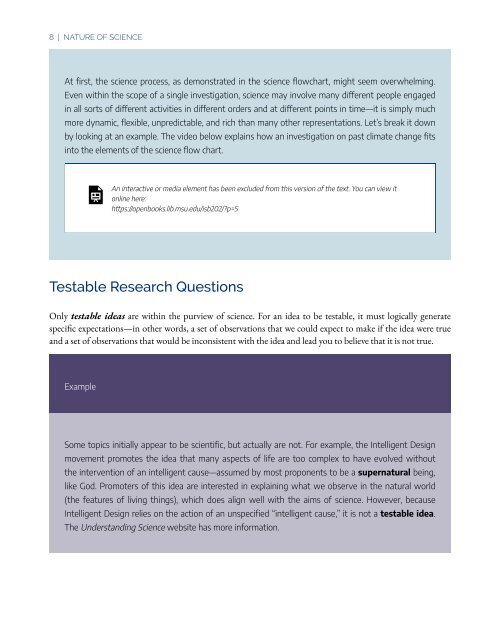An Interactive Introduction to Organismal and Molecular Biology, 2021
An Interactive Introduction to Organismal and Molecular Biology, 2021
An Interactive Introduction to Organismal and Molecular Biology, 2021
Create successful ePaper yourself
Turn your PDF publications into a flip-book with our unique Google optimized e-Paper software.
8 | NATURE OF SCIENCE<br />
At first, the science process, as demonstrated in the science flowchart, might seem overwhelming.<br />
Even within the scope of a single investigation, science may involve many different people engaged<br />
in all sorts of different activities in different orders <strong>and</strong> at different points in time—it is simply much<br />
more dynamic, flexible, unpredictable, <strong>and</strong> rich than many other representations. Let’s break it down<br />
by looking at an example. The video below explains how an investigation on past climate change fits<br />
in<strong>to</strong> the elements of the science flow chart.<br />
<strong>An</strong> interactive or media element has been excluded from this version of the text. You can view it<br />
online here:<br />
https://openbooks.lib.msu.edu/isb202/?p=5<br />
Testable Research Questions<br />
Only testable ideas are within the purview of science. For an idea <strong>to</strong> be testable, it must logically generate<br />
specific expectations—in other words, a set of observations that we could expect <strong>to</strong> make if the idea were true<br />
<strong>and</strong> a set of observations that would be inconsistent with the idea <strong>and</strong> lead you <strong>to</strong> believe that it is not true.<br />
Example<br />
Some <strong>to</strong>pics initially appear <strong>to</strong> be scientific, but actually are not. For example, the Intelligent Design<br />
movement promotes the idea that many aspects of life are <strong>to</strong>o complex <strong>to</strong> have evolved without<br />
the intervention of an intelligent cause—assumed by most proponents <strong>to</strong> be a supernatural being,<br />
like God. Promoters of this idea are interested in explaining what we observe in the natural world<br />
(the features of living things), which does align well with the aims of science. However, because<br />
Intelligent Design relies on the action of an unspecified “intelligent cause,” it is not a testable idea.<br />
The Underst<strong>and</strong>ing Science website has more information.


















